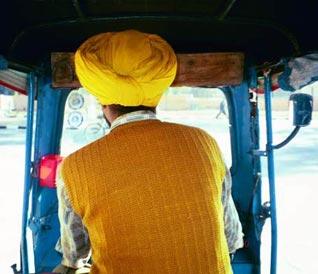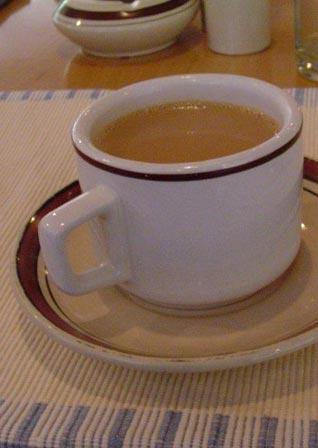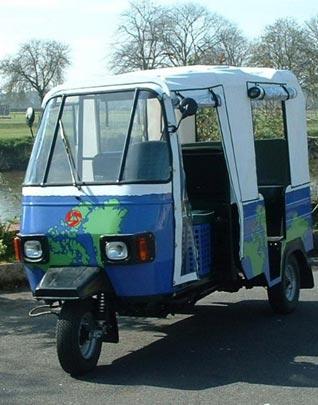Travel
The Reluctant
Auto-Rickshaw-Wallah
by CHARLES ANDERSON
When I first meet Manjot Singh, he looks like a bandit.
Behind the seat of his rusted blue auto-rickshaw, he jabbers in incomprehensible Punjabi. He wears a red woollen beanie pulled down over his forehead. A grimy yellowed white handkerchief is wrapped around his face.
The only thing that reveals anything is his eyes - thin, dark, conniving-looking.
He pulls over to the side of the road and tells me to get in. I do.
I tell him I want to go and see where the cricket bats are made. I tell him I want to go to one of the hundreds of factories dotted around Jalandhar's "Football Chowk". I tell him all this is English.
But Manjot Singh doesn't speak English. Not really, anyway.
Yet by way of charades, trial and error and persistent questioning of street traders, we find what I am looking for. We find Punjab's cricket manufacturing industry tucked away in side roads - in cubby holes with Kashmir willow blocks strewn across floors, with young men furiously carving those blocks into something that could conceivably be called a bat.
I give Manjot a thumbs up.
Across the road, we find a factory that has been operating since 1937. After Manjot politely asks the owner if I can have a look around, I meet him. Surjit Singh Jolly fires the names of two New Zealand cricket players at me.
"Do you know them?"
I say that I do.
"We make their gear here."
I give Manjot the thumbs up again. He pulls down his handkerchief and smiles, through the beginnings of an impressive-looking beard. He quietly waits outside.
After a tour of the factory, Manjot and I walk back to his rickshaw.
"Chai?" he asks. "My home?"
"Why not?" I reply. So we sail deeper into Jalandhar's outlying village.
We pass street vendors selling cellphone SIM cards, vegetables and bicycle wheels. We drive until the vendors are replaced by homes.
We pull into an alley. Manjot tucks his vehicle into a dark corner, and we walk through narrow streets with exposed, overhanging wiring. We turn corners in the fading gleam of the Punjab sunset. We walk until we arrive at a door, emblazoned with the words "Wel-Come" in cast iron.
Manjot knocks. His mother answers. He tells me he has a New Zealand journalist who wants some chai. At least, I imagine that's what he's saying.
His mother, a woman with subtle wrinkles and the same thin eyes, smiles and ushers me inside. Sitting in the family lounge, through stuttering - and, on reflection, impossible - conversation, Manjot tells me about his life.
Manjot is 23. He works as a garment salesman along with his brother. Three years ago, their father died - "expired", as he puts it. Money became scarce - so, to fill the gap, Manjot started driving a rickshaw.
He wears the handkerchief not to look menacing, or to protect his lungs from the exhaust fumes pumped out by Jalandhar's less than sympathetic trucking community; he wears it because he is ashamed.
Manjot does not want anyone recognising him as he drives passengers in his rusted blue machine around the streets of his home town. That is why he parks it in the dark a five-minute walk away from his cast iron door.
He rents the auto-rickshaw for 500 rupees a day. Some days, he makes enough to cover his costs. Some days, he doesn't.
Manjot's mother arrives in the lounge with samosas and cups of sweet, milky chai tea. She sits down and smiles again.
Manjot wants a better life. He wants better work. He wants to know about New Zealand and whether they need garment salesmen there.
The work is not here.
Manjot is part of the 51 per cent of India's 1.1 billion people who are under 25. He is part of what experts call a "youth bulge" that could become the country's greatest asset or a demographic disaster.
It is up to the government to produce education and jobs for its burgeoning workforce.
We eat together, and Manjot's mother offers me another samosa, then leaves the room.
Manjot pulls out a faded Punjabi-to-English language book with torn corners and scrawled blue pen marks from a previous owner.
He reads from it - lesson six, day three. "How are you?" he asks. I answer. He corrects my terrible Hindi with Punjabi.
"How is your girlfriend?" he asks. I answer.
"How old are you?" he asks. I answer.
He nods, faux knowingly.
The lights go out. Power cut. Manjot's mother somehow comes back in the pitch black, with a lit candle.
In the orange glimmer, Manjot writes his entire family's names in my notebook. He writes his email address, his phone numbers.
I say I have to get back. He tells me I have to wait for his brother, "Bobby".
Bobby rides a bullet, he says, and he will want to meet me.
You can hear Bobby coming home with a roar and a sputter.
We go outside. The 'bullet' is a motorcycle. Bobby shakes my hand furiously.
Manjot tells me to get on. I thank his mother in the Punjabi I have learned, and jump on behind Bobby. Manjot jumps on behind me. Then we sail back through the same alleys, now dark save for a blueish glow from the sparing street lighting.
Soon we are back in the corner where Manjot's rented, blue, rusted rickshaw sits.
He puts his handkerchief back on and takes a weathered grey rope from under the rickshaw's seat. He wraps it around the motor, and with two jerking pulls the vehicle splurts into life.
Manjot takes me back, past the factories and the SIM card sellers and the vegetable vendors, to my front door.
I say farewell and try to pay him for all his help. But he won't accept it. He puts up his hands in protest. I have to shove the money into his pocket. It will at least be the rent for his rickshaw tomorrow.
[Courtesy: Nelson Mail]
February 15, 2011
Conversation about this article
1: Ravinder Singh Khalsa (U.S.A.), February 15, 2011, 9:43 AM.
The Indian government which controls both the Central government, as well as the State government of Punjab, has decimated Punjab, Punjabis and Sikhs through economic oppression and flooding drugs into Punjab. I truly feel sad and sorry for those that remain in Punjab. The only option I can see is not voting for the Congress or SAD/ BJP (aka RSS), in an attempt to usher in a new future. I don't know much about Manpreet Singh (Badal) but I hope he can bring in a revolution. The other option is freedom from the Indian Union.
2: Karun Bhasin (Auckland, New Zealand), February 15, 2011, 2:39 PM.
While reading this, I was transported to Punjab. I strongly support what Ravinder Singh has said.
3: Devinder Singh (Sacramento, California, U.S.A. ), February 15, 2011, 4:53 PM.
I strongly agree with Ravinder Singh ji. SAD is a puppet in the hands of BJP and Advani, both of whom are always against Sikhs and Sikhism. There's some hope from Manpreet Singh and Captain Amrinder Singh. But from SAD, you can only expect worse - they only care about themselves.
4: G.C. Singh (U.S.A.), February 15, 2011, 11:55 PM.
Sikhs have been totally marginalized politically, economically and militarily by the cunning right-wing Hindu establishment. They have administered a body blow to the Sikh nation.





